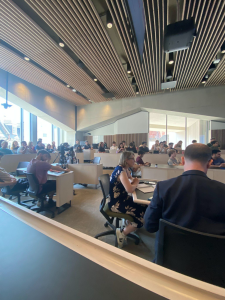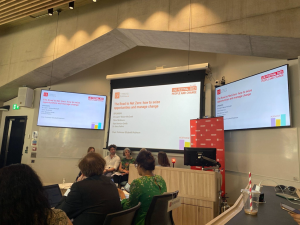Burch Student Experiences Reflect Cleantech Scene in Europe
July 18, 2023
Today started with all of us Burch kids gathered in the conference room of Winston House, UNC’s base of operations here in London. As we crunched on digestives and sipped from coffee cups, groups presented their case studies on topics of urban planning and development that we wrote about during our time in Freiburg that have since been expanded upon after our stints in Rotterdam and now, London. In my opinion, all of the groups did an excellent job discussing their findings, many of which were supported by things we’ve learned on various outings in cities, meetings with companies, and from living in these places period. It’s exciting to realize how much we’ve learned simply from immersing ourselves in these places and visits – I’m not sure the same would’ve been possible sitting at a desk for six weeks.
After our presentations, we walked down to Holborn and had a quick lunch in the surrounding area. At 1 PM, we filed into the London School of Economic’s Marshall Building to attend a panel on the U.K.’s road to net zero hosted by the LSE festival. This tagline for this year’s festival was “People and Change,” and it’s clear to see why net zero was included as a meaningful topic of interest: many people will need to enact change in order for nations to achieve net zero goals within the next few decades. Both the U.K. and the U.S. have committed to becoming carbon neutral by 2050, but these targets will require action on the sides of both public and private entities to be achieved.

Each of the four panelists shared insights I found fresh and/or interesting. Chris Skidmore, Chair of the U.K. Government’s Independent Net Zero Review, spoke first. He emphasized how nations are realizing that committing to net zero is no longer a risk; rather, the risk is remaining indifferent to our climate crisis. Government support from a regional level and from the bottom up, he argued, are necessary for developing roadmaps for local development. Rain Newton-Smith, Director General of the Confederation of British Industry, offered more of a business perspective, arguing that achieving net zero will take private investment and an inclusive job market. Dr. Liam F Beiser McGrath of LSE discussed how communication and framing are essential to gain public acceptance, especially when considering industries that may be left behind in the transition. Finally, Dr. Anna Valero of LSE noted how creative destruction can accelerate renewables, but needs to be directed to sustainable objectives to support net-zero ambitions.
Although all of the panelists were British, they emphasized how the U.K. should prioritize responding to the Inflation Reduction Act with their own policy. It’s exciting to know that others are now looking to our country to develop their own protocol to support further renewable scaling. The impact of the IRA and its many subsidies for clean energy may not be well-known among my generation, but its effects will hopefully be known in the future as we transition to cleaner energy, jobs, and climate.
About the Author
This article was written by Cynthia Wang, Class of 2026 who is majoring in Environmental Science.
